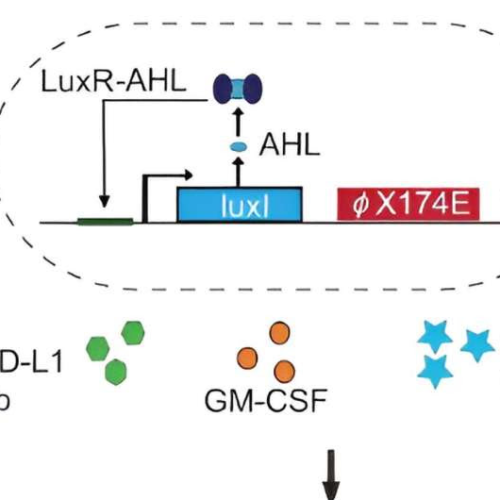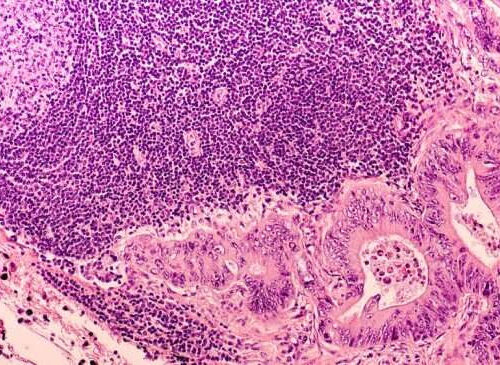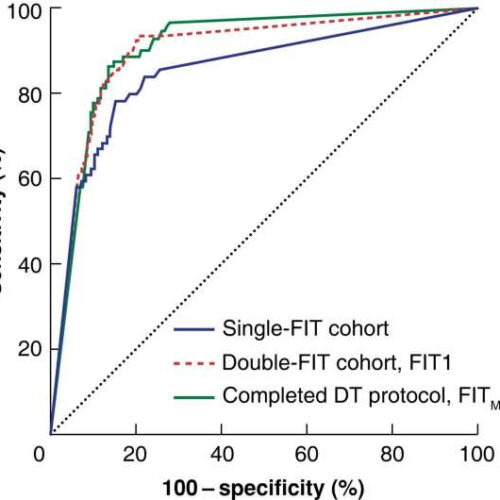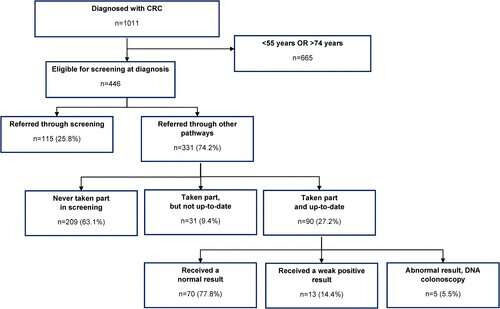by University of Glasgow TILs from mice treated with Salmonella are functionally defective. Credit: EMBO Molecular Medicine (2024). DOI: 10.1038/s44321-024-00159-2 Fighting bowel cancer with the bacteria Salmonella could be a step closer thanks to a new discovery by researchers at the University of Glasgow and the University of Birmingham. The new study, published in the journal EMBO Molecular Medicine, studied the...
Tag: <span>Bowel cancer</span>
Newly identified RNA molecules could help doctors predict if a patient’s bowel cancer will return
by University of Otago Overview of patient cohort for HCR-FISH. Credit: npj Precision Oncology (2024). DOI: 10.1038/s41698-024-00728-1. npj Precision Oncology (2024). DOI: 10.1038/s41698-024-00728-1 A University of Otago—Ōtākou Whakaihu Waka-led study could enable health professionals to separate colorectal cancer patients, who present at an early stage, into groups of those who will and won’t go on to develop metastasis and disease...
‘Cancer-cooling’ protein puts bowel cancer on ice
by Australian National University Credit: Pixabay/CC0 Public DomainA protein in the immune system can be manipulated to help overcome bowel cancer, according to new research from The Australian National University (ANU). The research is published in Science Advances. Bowel cancer claims more than 100 lives in Australia each week, yet around 90% of cases can be...
Detecting bowel cancer without a stool test
by South Australian Health and Medical Research Institute (SAHMRI) Schematic of orally-delivered EcN probiotic engineered to lyse and produce immunotherapeutic proteins in situ (top) and schematic of dosing regimen (bottom). Credit: Nature Communications (2024). DOI: 10.1038/s41467-024-44776-4An international team of researchers from Adelaide and the United States has opened the door to non-stool-based bowel cancer detection...
Researchers discover how bowel cancer ‘blinds’ the immune system
by University of Glasgow Microscopic image of an intestinal lymph node involved by metastatic colon cancer (colonic adenocarcinoma). Credit: Shutterstock A mystery which has stumped bowel cancer researchers for decades, has been solved by scientists at the Cancer Research UK Beatson Institute and University of Glasgow. Generations of doctors and researchers have struggled to understand why a bowel...
Double testing better at identifying bowel cancer
by University of Edinburgh Receiver operating characteristic (ROC) curve analysis for the detection of colorectal cancer between cohorts. Area under the curve 0.85 (95% c.i. 0.80 to 0.90) for the single-fecal immunochemical test (FIT) cohort, 0.90 (0.87 to 0.93) for the first FIT analyzed (FIT1) of patients who completed at least one test and investigation in...
Old drugs offer new ways of treating bowel cancer
by University of Auckland Credit: CC0 Public Domain Old medicines, combined in new ways, are showing promise for treating bowel cancer, a group of University of Auckland researchers has found. “While there have been advances in treatments for this disease in recent years, the development of new medicines is expensive and time-consuming,” lead researcher Professor Peter Shepherd...
Majority of patients with bowel cancer diagnosed outside of screening programs
by University of Surrey Clinical audit of men and women diagnosed with CRC at St Mark’s Hospital: 2017–2020. Credit: Journal of Medical Screening (2022). DOI: 10.1177/09691413221100969 More than 70% of patients with bowel cancer are not diagnosed using official screening programs meaning diagnoses are often made late, when the cancer is at an advanced stage, according to...
How accelerated biological aging may cause bowel cancer
ELIFE Scientists have shown how accelerated biological aging measured by an epigenetic clock may increase the risk of bowel cancer, according to a report published today in eLife. The study provides evidence that biological age might play a causal role in the increased risk of certain diseases, and paves the way for interventions that could...
Bowel cancer data reinforce need to reduce unnecessary antibiotic use
EUROPEAN SOCIETY FOR MEDICAL ONCOLOGY Lugano, Switzerland, 2 July 2021 – Doctors and patients are being advised to reduce unnecessary antibiotic use following new data suggesting that these medicines may increase the risk of cancer of the large intestine (colon), especially in people under 50 years. (1) The results, presented at the ESMO World Congress...
- 1
- 2






